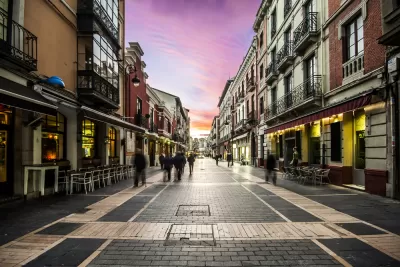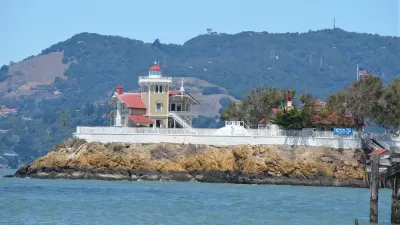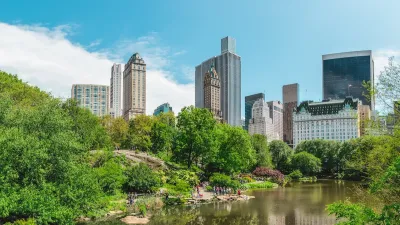Still battling a global pandemic and its widespread economic and social effects, cities nevertheless made progress in some unexpected ways.

Despite the challenges posed by the ongoing COVID-19 pandemic, writes Linda Poon, cities around the world managed to succeed in some innovative ways during 2021. Poon describes ten positive urban developments that led to "transformative — and in some cases unprecedented — changes toward improving residents’ health, safety and overall livability."
Some examples include:
- Glass panels that provide natural air flow and temperature regulation, such as those installed at Uber's Mission Bay headquarters. According to Poon, "the design addresses two of today’s most urgent crises: the pandemic and climate change" through better ventilation and reduced energy use for temperature control.
- The "one-minute city," a concept inspired by the "15-minute city." Rather than focusing on access to nearby amenities, this concept seeks to give residents control over the public realm just outside their homes.
- Affordable, accessible water vending machines installed in Nairobi, Kenya, where people living in informal settlements often lack access to clean water.
- A planned autonomous city in Japan. Toyota's Woven City, currently under construction at the base of Mount Fuji, will be a testing ground for autonomous transport and high-tech urban amenities.
- Criminal justice reforms. In the wake of high-profile police killings and calls for reform, cities have launched initiatives that divert calls about behavioral incidents to social workers in an effort to reduce the chances of fatal interactions with law enforcement.
Other promising programs mentioned in the article are universal basic mobility initiatives, Bogota's efforts to make childcare more accessible, and the trend of cities hiring "heat officers" as climate change leads to more extreme weather and more destructive wildfires.
FULL STORY: 10 Ways Cities Came Back in 2021

Planetizen Federal Action Tracker
A weekly monitor of how Trump’s orders and actions are impacting planners and planning in America.

Maui's Vacation Rental Debate Turns Ugly
Verbal attacks, misinformation campaigns and fistfights plague a high-stakes debate to convert thousands of vacation rentals into long-term housing.

Restaurant Patios Were a Pandemic Win — Why Were They so Hard to Keep?
Social distancing requirements and changes in travel patterns prompted cities to pilot new uses for street and sidewalk space. Then it got complicated.

In California Battle of Housing vs. Environment, Housing Just Won
A new state law significantly limits the power of CEQA, an environmental review law that served as a powerful tool for blocking new development.

Boulder Eliminates Parking Minimums Citywide
Officials estimate the cost of building a single underground parking space at up to $100,000.

Orange County, Florida Adopts Largest US “Sprawl Repair” Code
The ‘Orange Code’ seeks to rectify decades of sprawl-inducing, car-oriented development.
Urban Design for Planners 1: Software Tools
This six-course series explores essential urban design concepts using open source software and equips planners with the tools they need to participate fully in the urban design process.
Planning for Universal Design
Learn the tools for implementing Universal Design in planning regulations.
Heyer Gruel & Associates PA
JM Goldson LLC
Custer County Colorado
City of Camden Redevelopment Agency
City of Astoria
Transportation Research & Education Center (TREC) at Portland State University
Jefferson Parish Government
Camden Redevelopment Agency
City of Claremont





























